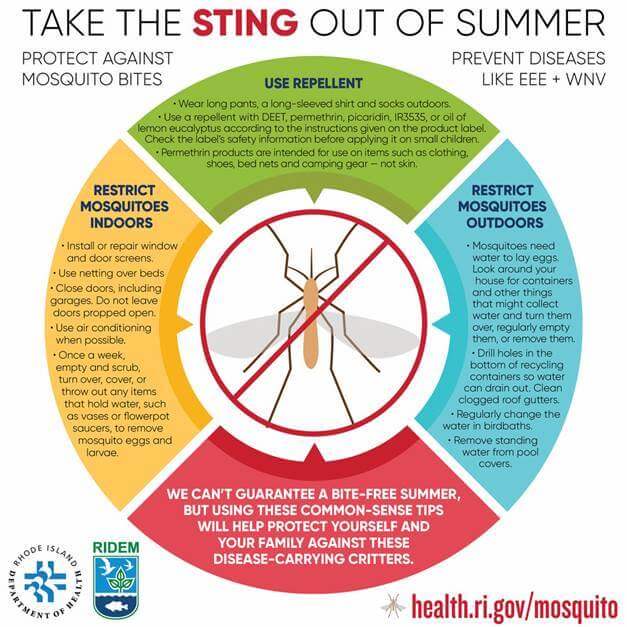

PROVIDENCE, RI — Rhode Island’s EEE and WNV risk is high, as mosquitoes carrying West Nile Virus (WNV) in Barrington, Johnston, Richmond, Tiverton, and Westerly and Eastern Equine Encephalitis (EEE) in Glocester have been found.
The Department of Environmental Management (DEM) and Rhode Island Department of Health (RIDOH) report that two mosquito samples collected Sept. 5 from a trap in Glocester tested positive for Eastern Equine Encephalitis (EEE) and mosquito samples from Barrington, Johnston, Richmond, Tiverton, and Westerly tested positive for West Nile Virus (WNV) also collected Sept. 5.
Not only are EEE and WNV risks high, but RIDOH and DEM warn it’s also a particularly active mosquito season. Both EEE and WNV are likely present in mosquitoes statewide, and Rhode Islanders should continue protecting themselves from mosquito bites until the first hard frost of autumn.
EEE and WNV risks
Although extremely rare in humans, EEE is very serious and has a much higher human mortality rate than WNV. Approximately 30% of people with EEE die and many survivors have ongoing neurological problems. Unlike WNV, which is prevalent in Rhode Island every year, EEE risk is variable, changing from year to year. For more information on EEE and ways to prevent it, please visit www.health.ri.gov/eee. WNV is the leading cause of mosquito-borne disease in the continental United States and is much more prevalent than EEE. Cases of WNV occur during mosquito season, which starts in the summer and continues through fall. There are no vaccines to prevent or medications to treat WNV in people. Fortunately, most people infected with WNV do not feel sick. About one in five people who are infected develop a fever and other symptoms. About one out of 150 infected people develop a serious, sometimes fatal, illness. For more information about WNV, please visit the RIDOH website.
Protect yourself from EEE and WNV bearing mosquitoes
- Put screens on windows and doors. Fix screens that are loose or have holes.
- At sunrise and sundown (when mosquitoes that carry EEE are most active), consider rescheduling outdoor activities that occur during evening or early morning. If you must be outside, wear long-sleeved shirts and long pants and use bug spray.
- Use EPA-approved bug spray with one of the following active ingredients: DEET (20-30% strength); picaridin, IR3535; and oil of lemon eucalyptus or paramenthane. Always read the label and follow all directions and precautions.
- Do not use bug spray with DEET on infants under two months of age. Children should be careful not to rub their eyes after bug spray has been applied on their skin. Wash children’s hands with soap and water to remove any bug spray when they return indoors.
- Put mosquito netting over playpens and baby carriages.
Get rid of mosquito breeding grounds
- Get rid of anything around your house and yard that collects water. Just one cup of water can produce hundreds of mosquitoes; an unused tire containing water can produce thousands of mosquitoes.
- Clean your gutters and downspouts so that they can drain properly.
- Remove any water from unused swimming pools, wading pools, boats, planters, trash and recycling bins, tires, and anything else that collects water, and cover them.
- Remove or treat any shallow water that can accumulate on top of a pool cover. Larvicide treatments, such asMosquito Dunks can be applied to kill immature mosquitoes. This environmentally-friendly product is available at many hardware and garden stores and on-line.
- Change the water in birdbaths at least two times a week and rinse out birdbaths once a week.
Best practices for horse owners
Horses are particularly susceptible to WNV and EEE. Horse owners are advised to vaccinate their animals early in the season and practice the following:
- Remove or cover areas where standing water can collect.
- Avoid putting animals outside at dawn, dusk, or during the night when mosquitoes are most active.
- Insect-proof facilities where possible and use approved repellents frequently.
- Monitor animals for symptoms of fever and/or neurological signs (such as stumbling, moodiness, loss of appetite) and report all suspicious cases to a veterinarian immediately. If you are unsure if your horse is properly vaccinated, you should consult with your veterinarian.
This is a test
